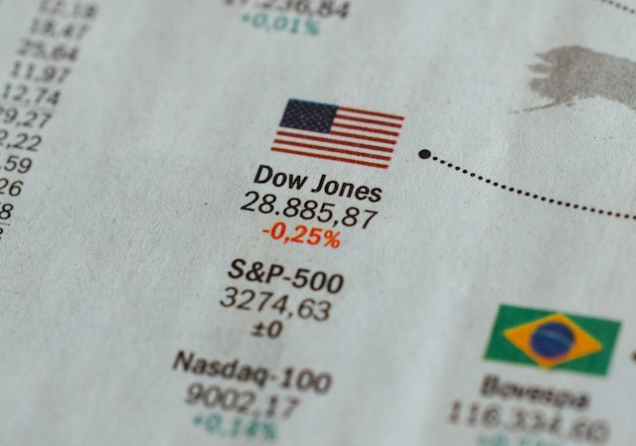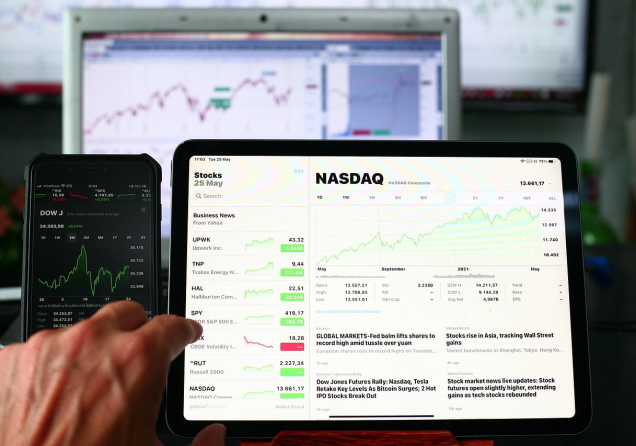NYSE Brokers - Top Picks to Access The New York Stock Exchange
The New York Stock Exchange (NYSE) is the largest and most influential stock exchange in the world, both in terms of market capitalisation and investor participation. The NYSE is a cornerstone of the global financial system and boasts a rich history dating back to 1792. Located on Wall Street, the NYSE is home to some of the most iconic and valuable companies globally, including Apple, Coca-Cola, JPMorgan Chase, and ExxonMobil, among many others.
For investors looking to trade assets on this prestigious exchange, selecting a reliable broker is critical. The ideal broker should offer competitive fees, robust trading platforms, strong regulatory oversight, and seamless access to NYSE-listed securities. In this article, we’ll explore NYSE brokers, focusing on the top picks to access the New York Stock Exchange.
Key Factors to Consider When Choosing an NYSE Broker
Choosing the right NYSE broker is a personal decision, shaped by your individual trading style, financial goals, and preferences. Nevertheless, several crucial factors should be at the forefront of every trader's consideration:
- Regulation - The regulatory standing of a broker is arguably the most critical aspect to evaluate. Traders must ensure their chosen broker is regulated by reputable financial authorities. Some of the top-tier organisations you can consider include the FCA, the CySEC, and the ASIC. Some brokers may also feature regulations in the US by organisations such as the SEC, the NFA, the CFTC, and the FINRA, which is a plus.
- Range of Financial Instruments - It's crucial to evaluate the collection of market products a broker provides. Confirm that the broker offers extensive access to NYSE-listed securities, alongside other major international markets.
- Trading Fees - Brokerage fees can significantly erode your trading profits. Examine and understand the commission structure, spreads, and any hidden costs that could affect your returns.
- Trading Platform - Traders should opt for brokers that provide advanced, user-friendly trading platforms. A good trading platform should offer real-time data, advanced charting tools, and smooth order execution.
Using the criteria listed above, let’s take a look at some of the best NYSE Brokers.
Top Brokers to Access the New York Stock Exchange
eToro
eToro is one of the top brokers that offer access to NYSE-listed stocks. On this broker site, traders can access a total of 1,715 different NYSE-listed stocks. The collection covers companies from diverse sectors such as technology giants, financial institutions, and consumer discretionary firms. Importantly, eToro offers NYSE-listed stocks both as CFDs and as real underlying assets. This means traders have the option to own actual shares of a company when purchasing its real stocks on eToro.
Regarding trading costs, eToro supports stock trading with competitive charges. For stock CFDs, traders typically pay a spread of 0.15%. In contrast, when trading real stocks, a commission of $1 or $2 may apply for opening and closing a position, depending on your country of residence and the stock exchange where the asset is listed.
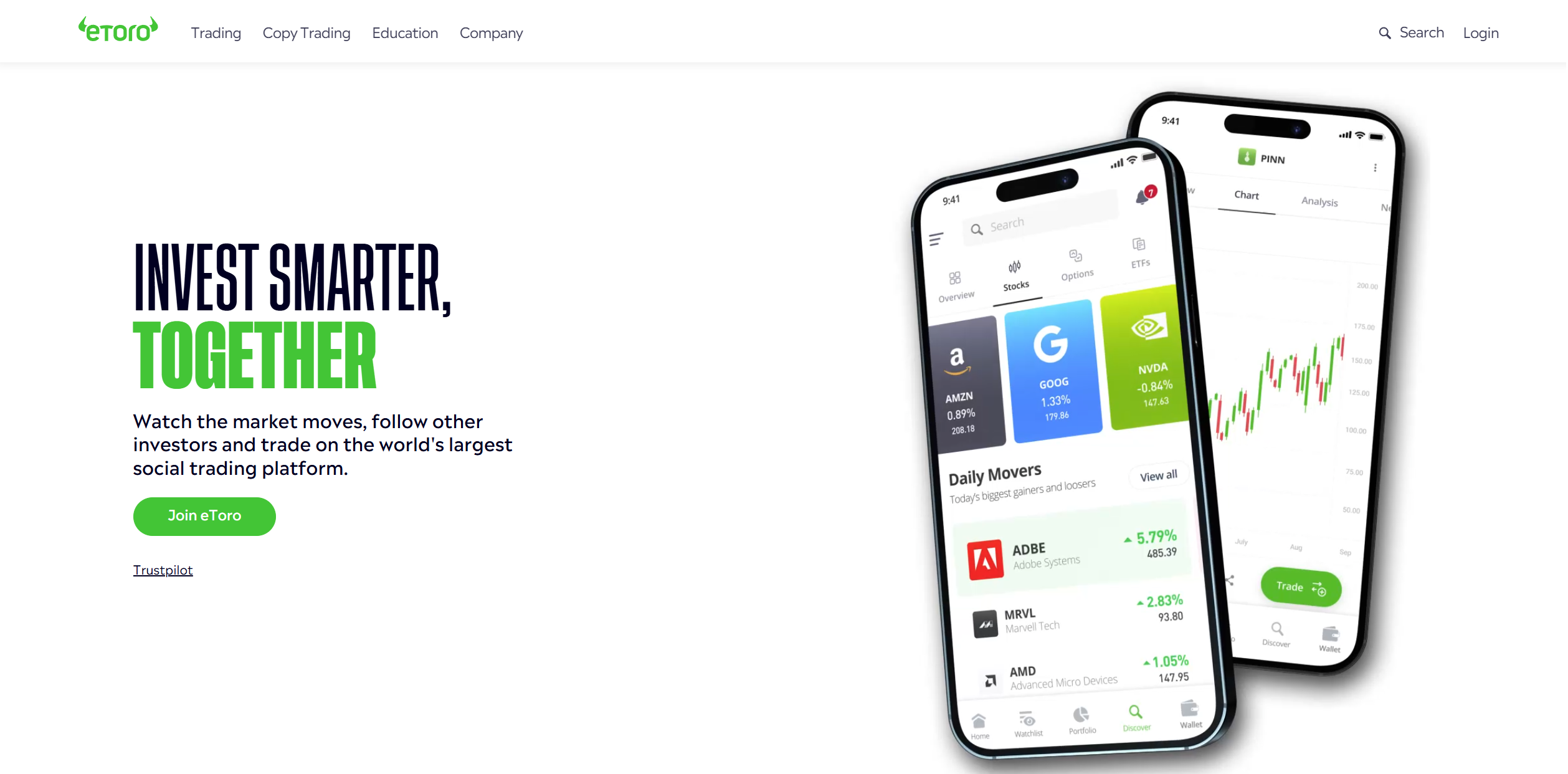 Spreads and commissions are subject to change. Check your platform for the most up to date data.
Spreads and commissions are subject to change. Check your platform for the most up to date data.
Beyond NYSE-listed stocks, eToro offers a wide array of other stocks and stock CFDs. In total, it provides access to over 6,000 different stocks from 20 different stock exchanges globally. Additionally, the broker gives access to other international markets, including forex, ETFs, commodities, indices, and cryptocurrencies, all available as CFDs. (CFDs are not available in the US). Cryptocurrencies are also available to trade as real underlying assets. For trading these instruments, eToro provides its proprietary platform. This platform is equipped with advanced features such as the CopyTrader technology that enables users to replicate the trades of other investors.
Regarding its regulation, eToro operates under the stringent supervision of several financial institutions. For starters, eToro is a broker-dealer registered with the SEC in the US and is a member of the FINRA. Additionally, the broker has regulation from the FCA in the UK, the ASIC in Australia, the CySEC in Cyprus, and the FSAS in Seychelles, among others.
61% of retail investor accounts lose money when trading CFDs with this provider.
Pepperstone
Pepperstone is another top contender for the best NYSE brokers. This broker provides access to a selection of US equities listed on the NYSE, all as CFDs. This allows traders to speculate on price movements without owning the underlying asset. Additionally, the broker supports the use of a variety of trading strategies, including scalping of stocks.
Pepperstone supports various powerful trading platforms that traders can use to place orders. These include MetaTrader 4, MetaTrader 5, cTrader, the Pepperstone Trading Platform, and TradingView. These platforms feature advanced charting tools, algorithmic trading capabilities through EAs, and lightning-fast execution.
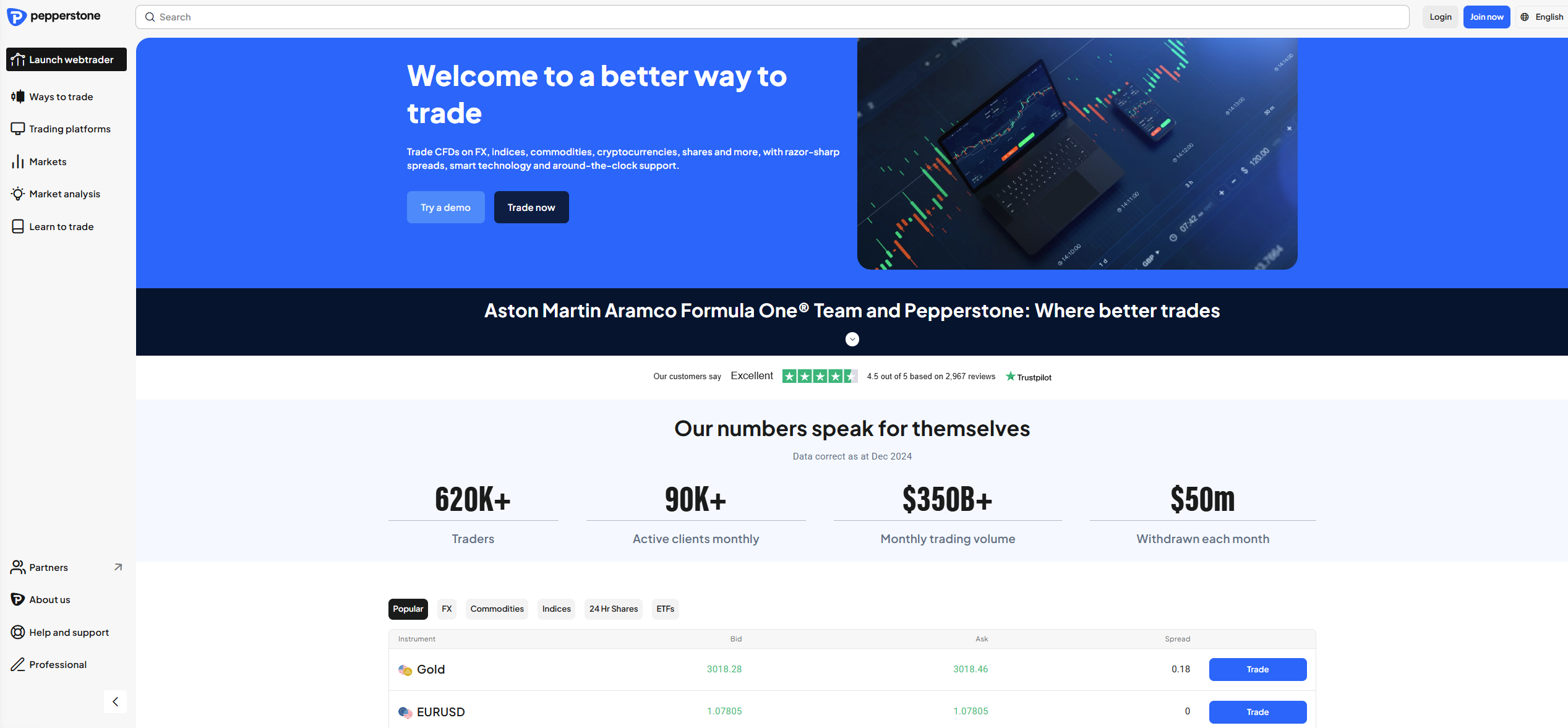 Spreads and commissions are subject to change. Check your platform for the most up to date data.
Spreads and commissions are subject to change. Check your platform for the most up to date data.
In addition to NYSE, Pepperstone also offers stock CFDs from various other exchanges, including the NASDAQ, the LSE, and the ASX, among others. Furthermore, investors can access a broad range of other market products, including CFDs on forex, indices, commodities, ETFs, and cryptocurrencies. The fees for trading stocks on Pepperstone vary based on the country of origin of the stocks. For US stocks, including those listed on the NYSE, traders generally pay a commission of $0.02 per share per side, with a similar minimum commission of $0.02 per trade.
Pepperstone maintains a high level of regulatory oversight, with licenses from several respected institutions. It is regulated by the FCA in the UK, the ASIC in Australia, the CySEC in Cyprus, the BaFin in Germany, and several other regulatory bodies worldwide. This comprehensive regulatory compliance emphasises Pepperstone's appeal for accessing NYSE stocks.
75.3% of retail CFD accounts lose money
HFM
HFM is another well-regulated broker that provides access to a substantial number of stocks, including those listed on the New York Stock Exchange as CFDs. Through HFM, traders can speculate on the price movements of popular NYSE-listed companies without directly owning the underlying shares. This broker operates under the regulation of the FSCA in South Africa, the FSC in Belize, the FCA, and the CySEC, among others.
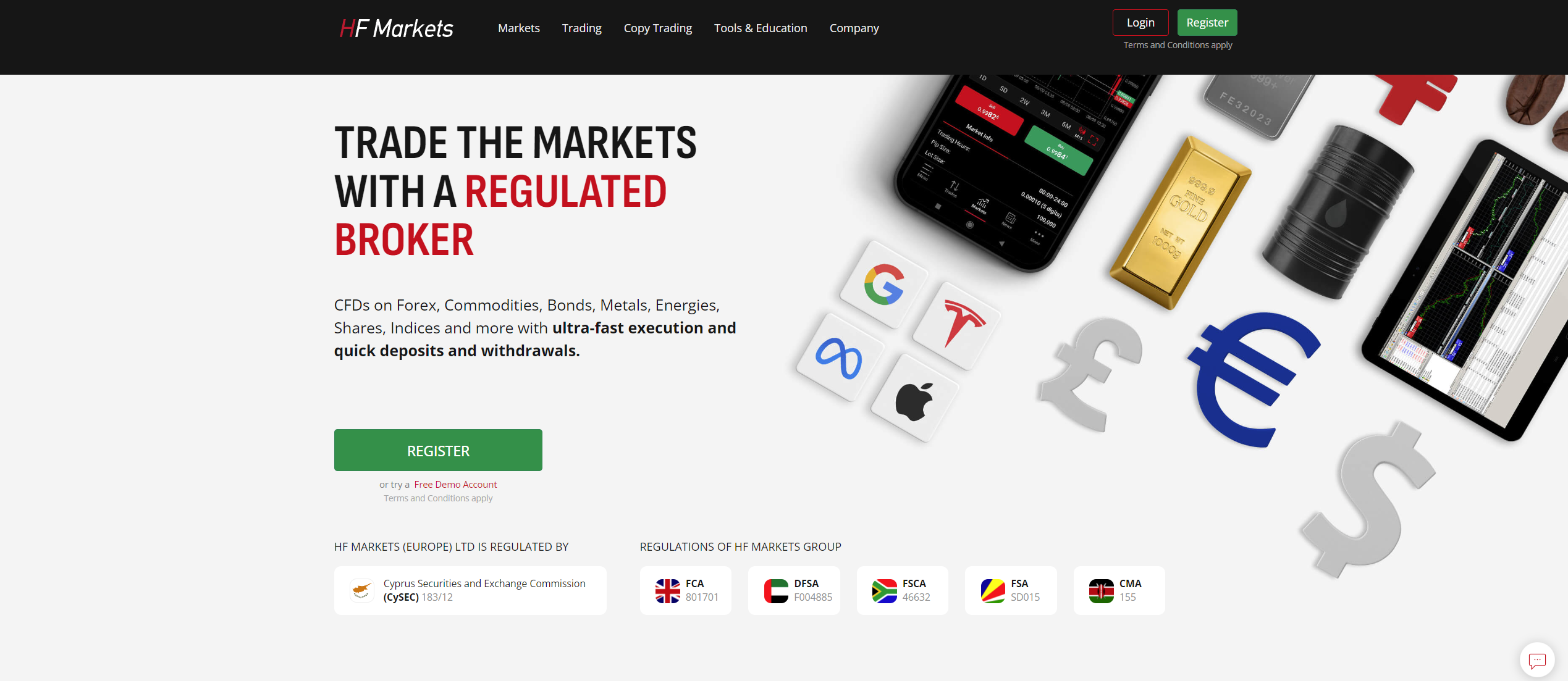 Spreads and commissions are subject to change. Check your platform for the most up to date data.
Spreads and commissions are subject to change. Check your platform for the most up to date data.
HFM offers highly competitive trading conditions for stocks. Spreads are consistently low across all accounts, typically below 0.7 points. There is also an accompanying commission of 0.1% per trade. The trading platforms available on the HFM site include MT4, MT5, and the HFM Platform. These are popular for their stability, advanced charting tools, and support for automated trading through Expert Advisors (EAs).
In addition to NYSE stocks, the broker provides access to other global markets, including forex, energy, indices, metals, bonds, commodities, cryptocurrencies, and ETFs, all available as CFDs.
Remember that Forex and CFDs available at HFM are leveraged products.
Their trading can result in the loss of your entire capital.
Forex.com
Forex.com is a highly reputable broker offering robust access to NYSE-listed stocks. The broker provides access to these NYSE-listed stocks as CFDs, allowing traders to speculate on price movements without owning the underlying assets. In addition to NYSE stocks, the broker offers access to other global markets, including CFDs on forex, indices, cryptocurrencies, commodities, and precious metals. It's important to note that these CFD instruments are only accessible to traders outside the US. US residents can only trade forex, futures, and futures options on this broker site.
In terms of trading conditions, Forex.com is known for its transparent fee structure. Equities generally have a low spread, depending on the specific asset, and a commission is charged depending on the stock exchange. For most US stocks, the commission is 1.8 cents per share. There is also a minimum commission rate is 5 of the stock's base currency.
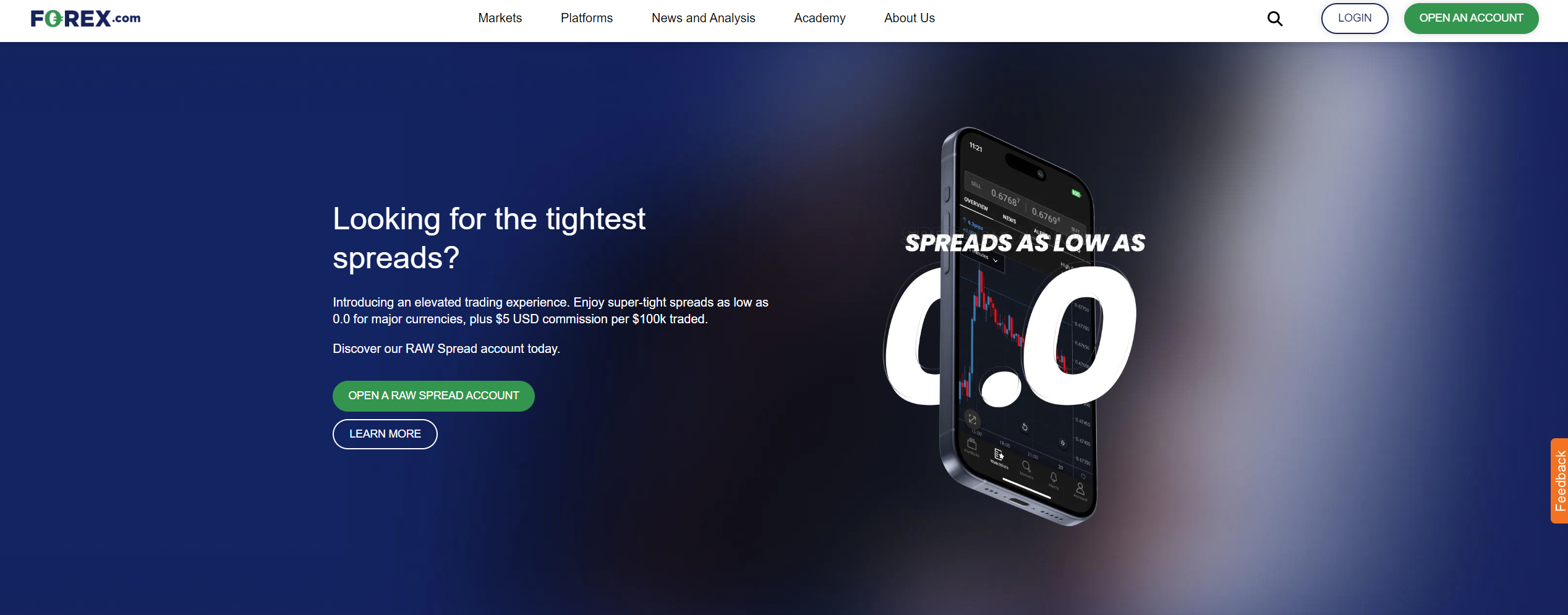 Spreads and commissions are subject to change. Check your platform for the most up to date data.
Spreads and commissions are subject to change. Check your platform for the most up to date data.
To trade on Forex.com, traders can choose from a variety of platforms, including MetaTrader 4, MetaTrader 5, TradingView, and the proprietary Forex.com Trader. In terms of regulation, Forex.com boasts one of the most robust oversight frameworks. Its parent company, StoneX, is regulated by numerous organisations. These include the CFTC and NFA in the US, the ASIC, the CySEC, the CIRO in Canada, and the FCA.
76-77% of retail investor accounts lose money when trading CFDs with this provider.
FP Markets
FP Markets is another top-tier broker that offers seamless access to the New York Stock Exchange. The NYSE-listed stocks available on FP Markets span various sectors, including technology, financials, energy, and consumer goods. On the FP Markets platform, traders can execute trades on MetaTrader 4 (MT4) or MetaTrader 5 (MT5). These platforms offer access to over 1,000 shares and stock CFDs, with MT5 providing a broader selection.
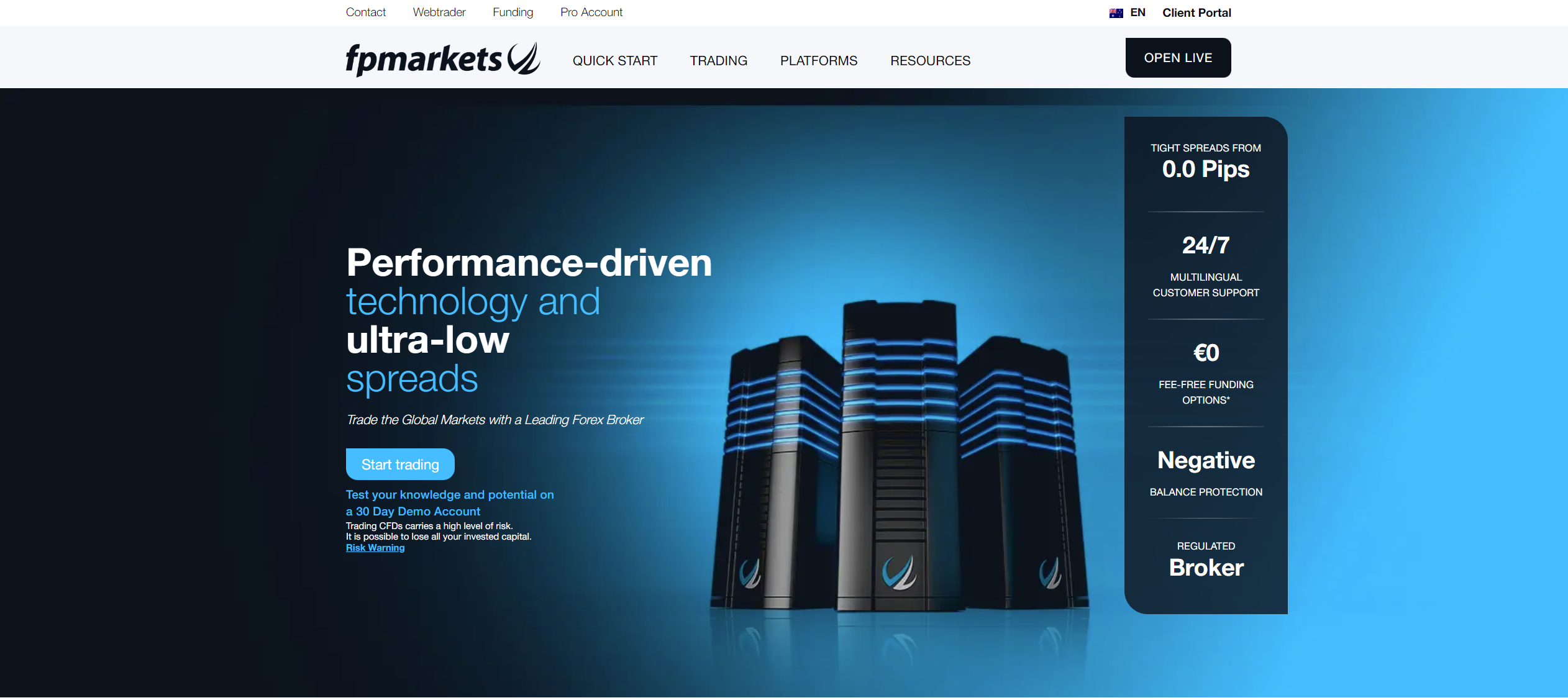 Spreads and commissions are subject to change. Check your platform for the most up to date data.
Spreads and commissions are subject to change. Check your platform for the most up to date data.
In terms of trading costs, FP Markets charges competitive commissions when trading stocks. For NYSE stock CFDs, FP Markets charges a commission of 2 cents per share, with a minimum charge of $2. FP Markets also provides access to a broad suite of other financial instruments. These include CFDs on forex, indices, commodities, metals, bonds, and ETFs.
From a regulatory standpoint, FP Markets is well-regulated by several authorities. These include ASIC in Australia, CySEC in Cyprus, and FSCA in South Africa, among others.
72.44% of retail CFD accounts lose money
Tickmill
Tickmill is a popular broker known for its competitive trading conditions and strong regulatory standing. This broker also offers access to NYSE-listed companies through Share CFDs. Traders on Tickmill can access NYSE equities like Apple, Amazon, JPMorgan Chase, and other blue-chip stocks. Since they are CFDs, traders can simply speculate on the price movements without necessarily owning the underlying instrument.
On a good note, Tickmill charges no commissions on stocks and claims some of the lowest spreads possible. The spreads on stocks are floating depending on market conditions. The broker supports several industry-leading trading platforms, including MetaTrader 4 (MT4), MetaTrader 5 (MT5), its own Tickmill Trader, and TradingView.
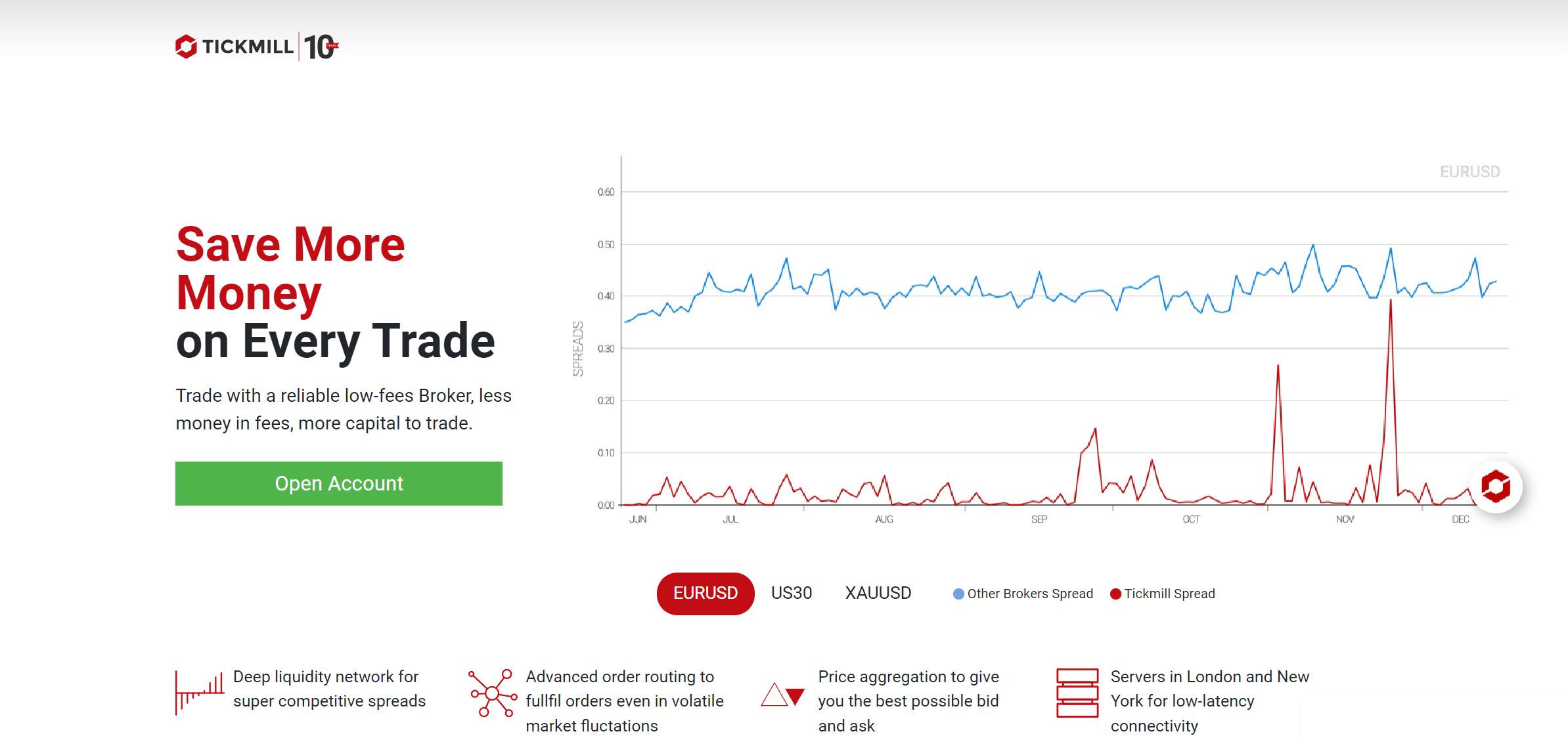 Spreads and commissions are subject to change. Check your platform for the most up to date data.
Spreads and commissions are subject to change. Check your platform for the most up to date data.
In addition to NYSE stocks, Tickmill also offers trading in a variety of global markets. These include CFDs on forex, metals, bonds, commodities, and cryptocurrencies. This provides stock traders with diverse opportunities to trade various instruments in highly liquid markets.
Finally, Tickmill operates under the regulation of several financial authorities globally. It holds licenses from the FCA, the CySEC, the ASIC, and the FSA in Seychelles. This level of regulatory oversight instils confidence in its safety and transparency.
71-74% of retail investor accounts lose money when trading CFDs with this provider.
XTB
XTB stands out as another solid choice for accessing NYSE-listed stocks both as CFDs and real underlying assets. This dual offering makes XTB a highly versatile broker suitable for various trading strategies. The NYSE-listed instruments on this broker site cover a wide range of sectors listed on the NYSE, including technology, finance, healthcare, energy, and more.
One of the standout features of XTB is its proprietary trading platform, xStation 5. This platform offers an intuitive design, real-time market data, customizable charting tools, and fast execution speeds. In terms of fees, XTB offers competitive and transparent pricing that is affordable for most traders.
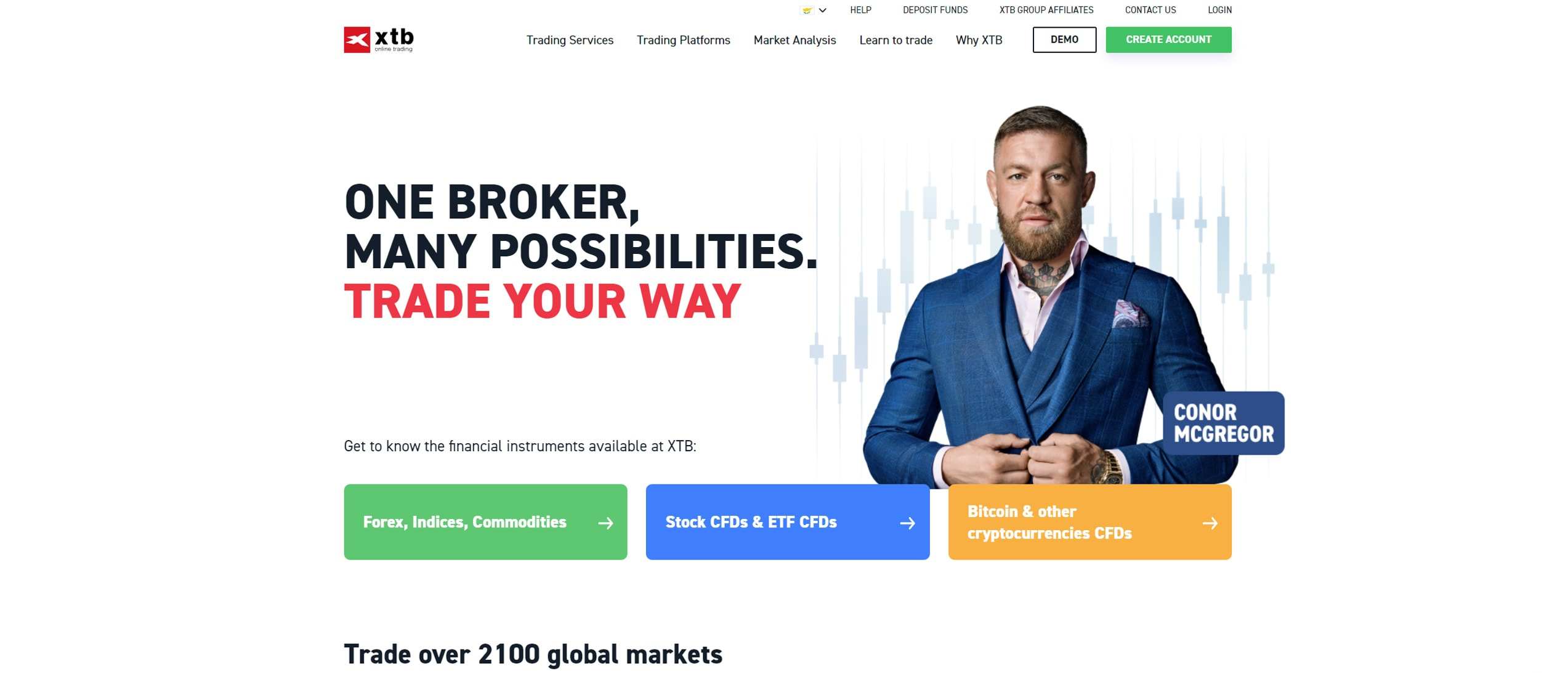 Spreads and commissions are subject to change. Check your platform for the most up to date data.
Spreads and commissions are subject to change. Check your platform for the most up to date data.
When trading stocks as real assets on XTB, a 0% commission applies for monthly turnovers of up to EUR 100,000 (or equivalent in other currencies) per account. For trades exceeding this amount, the broker charges a commission of 0.2%. For stock CFDs, the broker applies a variable spread that depends on the specific share and prevailing market conditions.
XTB boasts a reputable regulatory background. It operates under the strict supervision of the FCA in the UK, CySEC in Cyprus, and KNF in Poland, among other regulatory bodies.
75-78% of retail investor accounts lose money when trading CFDs with this provider.
IG
IG is a global brokerage firm famous for providing one of the deepest collections of stocks from around the world. This broker offers a vast selection of NYSE-listed stocks as CFDs. The NYSE-listed stocks offered by IG cover a wide range of sectors, including technology, finance, healthcare, and consumer goods, enabling investors to diversify their portfolios effectively.
Moreover, IG offers a plethora of other market products, including CFDs on forex, indices, commodities, cryptocurrencies, thematic and basket assets, options, bonds, and ETFs. The trading platforms available to use on this broker site include MT4, L2 Dealer, ProRealTime, TradingView, and its own IG Trading Platform.
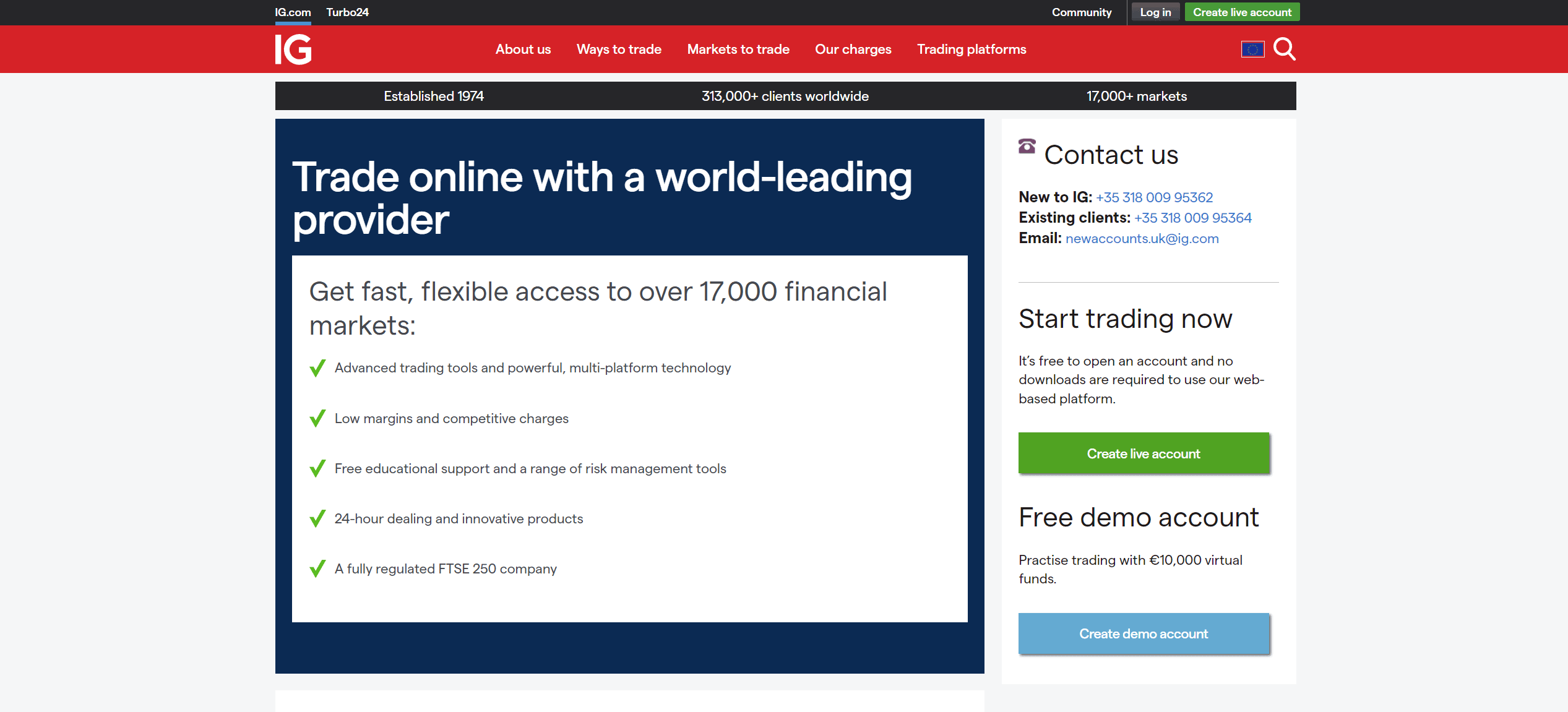 Spreads and commissions are subject to change. Check your platform for the most up to date data.
Spreads and commissions are subject to change. Check your platform for the most up to date data.
IG charges competitive fees for trading NYSE-listed stocks. The commission for US shares is typically $0.02 per share per side, with a minimum commission of $15 when trading online and $25 when trading on phones. IG is a highly regulated broker, operating under the supervision of the FCA, the ASIC, the BaFin, and the FSCA, among others.
70-74% of retail investor accounts lose money when trading CFDs with this provider.
Why Trade NYSE-Listed Assets?
The NYSE is a preferred destination for investors for various compelling reasons. Here are some key highlights:
- Global Significance - As the world's largest stock exchange by market capitalisation, the NYSE attracts a diverse array of major corporations and institutional investors from across the globe. Many NYSE-listed companies have extensive international operations, providing investors with indirect exposure to global economic trends.
- Diverse Investment Opportunities - The NYSE offers trading in an unparalleled range of companies, from established blue-chip corporations like Apple and Microsoft to innovative emerging growth stocks. It also includes access to key US indices such as the Dow Jones Industrial Average and the S&P 500.
- Strong Regulatory Framework - The NYSE operates under its own robust regulatory framework, NYSE Regulation (NYSER). Additionally, its operations are under the supervision of the SEC and FINRA in the United States.
- High Liquidity - The NYSE is one of the most liquid markets globally, characterised by high trading volumes. This ensures that investors can typically buy and sell assets with ease and at competitive prices.
Closing Remarks
The New York Stock Exchange offers a wealth of investment opportunities for traders seeking exposure to the world's largest economy. Whether you’re looking for long-term ownership or prefer short-term speculative trades, selecting the right broker is key. The brokers highlighted in this article stand out as top choices due to their strong regulatory frameworks, competitive fee structures, and advanced trading platforms.
However, remember that the best NYSE broker is subjective and depends heavily on your individual trading needs, experience level, and financial objectives. This article features some generally well-regarded brokers that offer access to the NYSE, but it is not an exhaustive list. It is crucial to conduct your own thorough research and consider your specific requirements before making a final decision.
Top-Tier Trusted Brokers
The table below contains links to 3rd party websites of our top partners from whom we receive compensation at no additional cost to you.

















